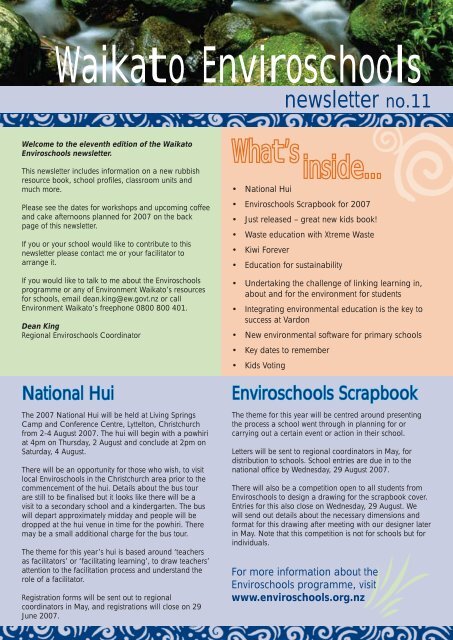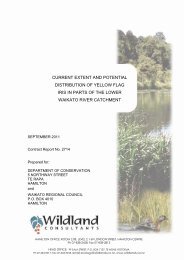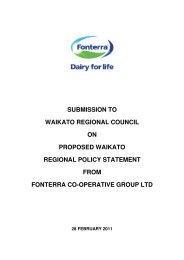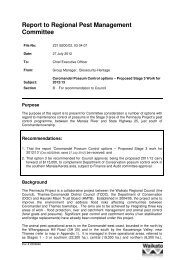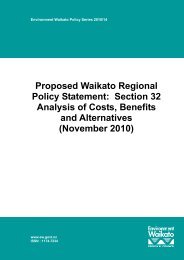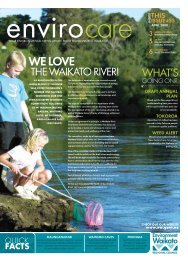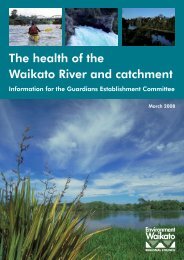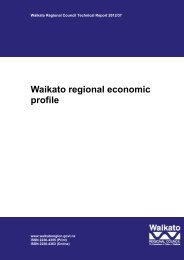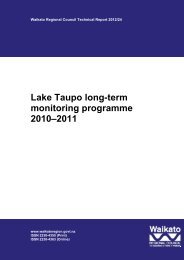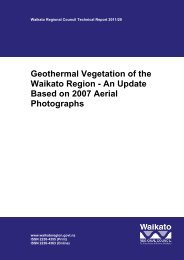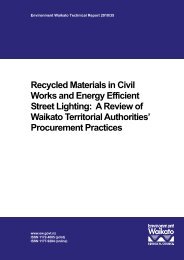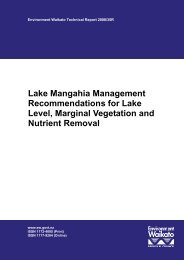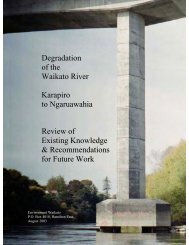Enviroschools Newsletter no. 11 - May 2007 - Waikato Regional ...
Enviroschools Newsletter no. 11 - May 2007 - Waikato Regional ...
Enviroschools Newsletter no. 11 - May 2007 - Waikato Regional ...
Create successful ePaper yourself
Turn your PDF publications into a flip-book with our unique Google optimized e-Paper software.
<strong>Waikato</strong> <strong>Enviroschools</strong><br />
newsletter <strong>no</strong>.<strong>11</strong><br />
Welcome to the eleventh edition of the <strong>Waikato</strong><br />
<strong>Enviroschools</strong> newsletter.<br />
This newsletter includes information on a new rubbish<br />
resource book, school profiles, classroom units and<br />
much more.<br />
Please see the dates for workshops and upcoming coffee<br />
and cake after<strong>no</strong>ons planned for <strong>2007</strong> on the back<br />
page of this newsletter.<br />
If you or your school would like to contribute to this<br />
newsletter please contact me or your facilitator to<br />
arrange it.<br />
If you would like to talk to me about the <strong>Enviroschools</strong><br />
programme or any of Environment <strong>Waikato</strong>’s resources<br />
for schools, email dean.king@ew.govt.nz or call<br />
Environment <strong>Waikato</strong>’s freephone 0800 800 401.<br />
Dean King<br />
<strong>Regional</strong> <strong>Enviroschools</strong> Coordinator<br />
National Hui<br />
The <strong>2007</strong> National Hui will be held at Living Springs<br />
Camp and Conference Centre, Lyttelton, Christchurch<br />
from 2-4 August <strong>2007</strong>. The hui will begin with a powhiri<br />
at 4pm on Thursday, 2 August and conclude at 2pm on<br />
Saturday, 4 August.<br />
There will be an opportunity for those who wish, to visit<br />
local <strong>Enviroschools</strong> in the Christchurch area prior to the<br />
commencement of the hui. Details about the bus tour<br />
are still to be finalised but it looks like there will be a<br />
visit to a secondary school and a kindergarten. The bus<br />
will depart approximately midday and people will be<br />
dropped at the hui venue in time for the powhiri. There<br />
may be a small additional charge for the bus tour.<br />
The theme for this year’s hui is based around ‘teachers<br />
as facilitators’ or ‘facilitating learning’, to draw teachers’<br />
attention to the facilitation process and understand the<br />
role of a facilitator.<br />
Registration forms will be sent out to regional<br />
coordinators in <strong>May</strong>, and registrations will close on 29<br />
June <strong>2007</strong>.<br />
What’s inside...<br />
• National Hui<br />
• <strong>Enviroschools</strong> Scrapbook for <strong>2007</strong><br />
• Just released – great new kids book!<br />
• Waste education with Xtreme Waste<br />
• Kiwi Forever<br />
• Education for sustainability<br />
• Undertaking the challenge of linking learning in,<br />
about and for the environment for students<br />
• Integrating environmental education is the key to<br />
success at Vardon<br />
• New environmental software for primary schools<br />
• Key dates to remember<br />
• Kids Voting<br />
<strong>Enviroschools</strong> Scrapbook<br />
The theme for this year will be centred around presenting<br />
the process a school went through in planning for or<br />
carrying out a certain event or action in their school.<br />
Letters will be sent to regional coordinators in <strong>May</strong>, for<br />
distribution to schools. School entries are due in to the<br />
national office by Wednesday, 29 August <strong>2007</strong>.<br />
There will also be a competition open to all students from<br />
<strong>Enviroschools</strong> to design a drawing for the scrapbook cover.<br />
Entries for this also close on Wednesday, 29 August. We<br />
will send out details about the necessary dimensions and<br />
format for this drawing after meeting with our designer later<br />
in <strong>May</strong>. Note that this competition is <strong>no</strong>t for schools but for<br />
individuals.<br />
For more information about the<br />
<strong>Enviroschools</strong> programme, visit<br />
www.enviroschools.org.nz
Just released great new kids book!<br />
Reed Publishing have just released a great kids book by local Rachael Goddard called<br />
‘Rubbish! – Everything you ever wanted to k<strong>no</strong>w about rubbish, landfills, recycling and<br />
worms’. The 32 page book is packed with facts, big colour photos, activities and a cartoon<br />
narrator called Kevin Cockroach who guides kids through the book – introducing them to the<br />
less savoury environmental impacts of waste and landfills.<br />
Kids will find out exactly what is in landfills, how much we are throwing away, how to carry<br />
out a waste audit and how to make a worm farm. This book is a very timely publication<br />
with the popularity of ‘Wasted’ on TV3.<br />
The book is available at Whitcoulls and Paper Plus and retails for $19.95. For more<br />
details visit the Reed Publishing website www.reed.co.nz.<br />
Rachael is an environmental consultant and manager for Te Kauri Waikuku Trust, who<br />
teach 1000 school children in environmental education each year. For more information visit www.<br />
tekauri.org.nz.<br />
Waste education<br />
with Xtreme Waste<br />
Xtreme Waste, a <strong>no</strong>n-profit community organisation based<br />
in Whaingaroa/Raglan, offers a wide range of education<br />
services regarding waste minimisation and zero waste<br />
to schools for free. Xtreme Waste offers tours of its site<br />
to visiting groups, providing an in-depth insight on the<br />
different types of waste and how each is reused or recycled.<br />
Alternatively, an Xtreme Waste educator can visit your<br />
school.<br />
Xtreme Waste is able to provide this service through a<br />
contract with Environment <strong>Waikato</strong> to provide mentoring<br />
and advisory services within the <strong>Waikato</strong> region, and a<br />
contract with <strong>Waikato</strong> District Council to run a pilot waste<br />
education in schools programme.<br />
Services available to schools include:<br />
• assistance and advice with setting up recycling facilities<br />
and reducing waste in the school – including<br />
composting and worm farming with ongoing support<br />
• waste audits<br />
• teaching resources – loan of materials<br />
• site visits and tours of Xtreme Waste combined with zero<br />
waste activities (Tuesdays and Thursdays)<br />
• general school visits for talks and information about<br />
Xtreme Waste, what they do and other related topics<br />
• teaching units delivered by an Xtreme Waste educator<br />
(available only to schools within the <strong>Waikato</strong> district).<br />
Please don’t hesitate to contact either Jacqui or Lindsey by<br />
phone (07) 825 6509, or email<br />
education@xtremewaste.org.nz for more information.<br />
Kids Voting<br />
Kids Voting gives year 9 students the opportunity to<br />
participate in an authentic voting experience. Students vote<br />
for real candidates, on a real ballot paper, and compare<br />
the results from the kids’ election with the results of the real<br />
election.<br />
Kids Voting is designed to raise awareness among young<br />
people about New Zealand’s electoral processes. In<br />
New Zealand, as in most developed democracies, voter<br />
tur<strong>no</strong>ut is falling and levels of political engagement are<br />
low among young people. Building first-hand experience<br />
of active participation by young people will increase their<br />
personal understanding, belief and confidence in electoral<br />
participation.<br />
Visit the Kids Voting website www.kidsvoting.org.nz.<br />
The website provides you with information about Kids<br />
Voting and how you can be part of it for the <strong>2007</strong> local<br />
government elections. Kids Voting will be run each year<br />
in conjunction with local government elections (<strong>2007</strong>),<br />
Parliamentary elections (2008) and a third option in 2009.<br />
Is Kids Voting only for local authorities<br />
Kids Voting is only available for city and district councils for<br />
the <strong>2007</strong> local government elections, and <strong>no</strong>t for regional<br />
council elections. Kids Voting will <strong>no</strong>t be available for district<br />
health board elections.
Kiwi Forever 31 March to 5 April <strong>2007</strong><br />
Lynette Brown<br />
EFS Adviser – School Support Services<br />
The Kiwi Forever scholarship programme for secondary students has been created as a<br />
partnership with Bank of New Zealand Save the Kiwi Trust, Untouched World Foundation,<br />
Department of Conservation, University of <strong>Waikato</strong> and Ngati Rangi. It is based on the<br />
concepts outlined in the Kiwi Forever education resource, field-worked with DOC, culturallyimmersed<br />
with Ngati Rangi, and modelled on Untouched World Foundation’s student-led,<br />
teacher-supported programmes throughout New Zealand.<br />
Fourteen senior students from six central North Island secondary schools came together at Tirorangi Marae (Ohakune) for<br />
six days at the end of term 1. Students, teachers and pre-service teachers participated in a range of hands-on conservation<br />
work including pest trapping and control, foliage counts and kiwi tracking, while gaining an in-depth understanding of the<br />
holistic nature of the native bush and how it provides valuable habitat for New Zealand’s unique flora and fauna. One of<br />
the main highlights of the week was the release of a kiwi chick returned to the area from Bushy Park. The egg had been<br />
uplifted last year and hatched in captivity before being returned to Karioi Rahui, where the expected rate of survival is over<br />
90 per cent.<br />
Students endeavoured to keep their ecological footprint light by travelling in vans, composting food scraps and by planting<br />
native rongoa species in the marae grounds. Regular reflection by all adults and students repeatedly ack<strong>no</strong>wledged the<br />
personal growth of students during the week, the increased understanding of the relationship local iwi have with the land,<br />
the significance of kiwi to our identity as New Zealanders and the importance of saving the kiwi.<br />
At the conclusion of the week students presented to an audience of iwi representatives, DOC personnel, representatives<br />
from BNZ and the local education community. Their presentations addressed four key questions.<br />
• What is the importance of the recovery and enhancement of the habitat to ensure the maintenance of healthy kiwi<br />
populations<br />
• What is the significance of kiwi to the local iwi<br />
• What is the purpose of a national icon and how does this influence our identity as New Zealanders called ‘kiwis’<br />
• What would be the social, cultural, political, eco<strong>no</strong>mic and environmental impacts of losing the kiwi as our national<br />
identity<br />
Students <strong>no</strong>w return to their respective schools and are expected to make presentations both within their schools and the<br />
wider community. Throughout these they will be addressing the long-term benefits of moving towards sustainability and the<br />
role of young adults in achieving these positive outcomes.
Undertaking the challenge of<br />
linking learning in, about and for the environment for students<br />
By Marianne Robertson and Robyn Irving<br />
A living curriculum is one of the key areas of school life in the<br />
<strong>Enviroschools</strong> programme that continues to challenge schools.<br />
“A living curriculum is integrating the environmental education<br />
(EE) curriculum into all aspects of school life.<br />
This will enable students and teachers to:<br />
• take action on real issues in the school and community<br />
• use the whole school environment as a learning resource<br />
• promote critical questioning on resource use and lifestyle<br />
• promote reflection on personal values and behaviours.”<br />
(<strong>Enviroschools</strong> Handbook, 2005).<br />
The Environmental Education Guidelines for New Zealand<br />
Schools were introduced to schools in 1999 by the Ministry of<br />
Education. The guidelines outline the aims of environmental<br />
education, the key concepts and the dimensions of<br />
environmental education. Links are made to the curriculum<br />
statements and examples of integrated units are given.<br />
However, research within New Zealand schools has identified<br />
that this resource is under-utilised by teachers. Many teachers<br />
are unaware of this document’s existence and/or are unfamiliar<br />
with the contents. This presents a problem for schools actioning<br />
the <strong>Enviroschools</strong> programme as it appears many teachers<br />
are unsure how to integrate environmental education into their<br />
curriculum and <strong>Enviroschools</strong> programmes.<br />
The guidelines define environmental education as:<br />
A multi disciplinary approach to learning that develops the<br />
k<strong>no</strong>wledge, awareness, attitudes, values and skills that will<br />
enable individuals and community to contribute towards<br />
maintaining and improving the quality of the environment.<br />
(Environmental Education Guidelines for New Zealand Schools,<br />
p. 9).<br />
Because of the complexity of this, a holistic approach to<br />
learning for sustainability is appropriate.<br />
Therefore students need to develop:<br />
• awareness and sensitivity to the environment and<br />
related issues<br />
• k<strong>no</strong>wledge and understanding of the environment and<br />
the impact of people on it<br />
• attitudes and values that reflect feelings of concern for<br />
the environment<br />
• skills involving identifying, investigating and problem<br />
solving associated with environmental issues<br />
• a sense of responsibility through participation and<br />
action as individuals, or members of groups in<br />
addressing environmental issues.<br />
(Environmental Education Guidelines for New Zealand Schools,<br />
p. 9).<br />
In reality this has proven difficult for schools to achieve.<br />
The key dimensions of environmental education stated in<br />
the guidelines promote education in, about and for the<br />
environment. (Environmental Education Guidelines for New<br />
Zealand Schools, p. 14).<br />
Education in the environment provides experiences beyond<br />
the classroom for students and teachers. The benefits of<br />
learning in the environment raise students’ k<strong>no</strong>wledge and<br />
awareness, give opportunities to develop practical skills<br />
and help develop an appreciation of, and concern for the<br />
environment.<br />
Practical opportunities might include measuring, classifying,<br />
observing and data collection. Contexts could be the school<br />
grounds, the transfer station or recycling centre, a local stream,<br />
beaches, bush areas or restoration sites.<br />
Education about the environment provides the opportunity<br />
to gain k<strong>no</strong>wledge and understanding of environmental<br />
concepts and issues. These should include the key concepts<br />
of environmental education (interdependence, biodiversity,<br />
sustainability and personal and social responsibility for action).<br />
The curriculum statements provide links for considering<br />
environmental issues which may include political, cultural,<br />
ecological and eco<strong>no</strong>mic factors. There are clear connections<br />
between these and the <strong>Enviroschools</strong> guiding principles and<br />
kaupapa.<br />
Approaches could include action, experiential and inquiry<br />
learning. See the action learning cycle in the <strong>Enviroschools</strong><br />
handbook for ideas. There are many resources available to<br />
help support learning, including the <strong>Enviroschools</strong> kit. Learning<br />
can be facilitated through the learning theme areas (zero waste,<br />
living landscapes, precious energy, healthy water and ecological<br />
buildings) and the <strong>Enviroschools</strong> videos and annual scrapbooks.<br />
Education for the environment is students taking action<br />
towards improving the quality of the environment. It is<br />
based on students’ k<strong>no</strong>wledge and understanding about the<br />
environment and their practical experience in the environment.<br />
Education for the environment occurs when students have<br />
undertaken the process of learning, exploring alternatives,<br />
consulting, planning and decision making around an<br />
identified issue. This is a critical step in students’ learning and<br />
understanding.<br />
All three dimensions to learning are interdependent if the<br />
aims of environmental education are to be achieved. However,<br />
often what occurs is that at least one dimension is omitted from<br />
the learning experience. Here lies the challenge!<br />
If we want our students of today to be able to make informed<br />
decisions and take effective action they need to have<br />
learning in all three dimensions. It might be that there is a<br />
misunderstanding of what an action as opposed to an activity is.<br />
The following table presents different scenarios and examples to<br />
explain the three dimensions.
Scenario 1: Teachers (and students) think rubbish is a problem in the school. The school incinerator needs to be decommissioned. It<br />
costs a lot to pay for a rubbish skip.<br />
Issue: Is there a need to do something about the existing waste management methods<br />
Action: Teachers and students of a senior syndicate, or class, plan a zero waste unit.<br />
Education in the<br />
environment<br />
A waste audit is completed by a class or Envirogroup. Data is recorded and shared with the rest of the<br />
school at a school assembly or display. Carry out activities from the zero waste section of the <strong>Enviroschools</strong><br />
kit.<br />
Education about the<br />
environment<br />
Visit a local transfer station to investigate what happens to rubbish in the community.<br />
Investigation about reducing, recycling and reusing resources. Carry out experiments and activities from<br />
building science concepts booklets about recycling and rubbish.<br />
Research organic and i<strong>no</strong>rganic materials. This leads to an understanding about classification and sorting<br />
of different types of waste.<br />
Write letters to the local council or community providers to ask about their services.<br />
Research about decomposition, worms and composting methods.<br />
Education for the<br />
environment<br />
Organise a visit from a community expert. This might lead to k<strong>no</strong>wledge about different ways of dealing<br />
with waste. Search through the <strong>Enviroschools</strong> scrapbooks to see what other schools have done. Visit or<br />
email a<strong>no</strong>ther school to find out more information about an action project.<br />
Students complete an action plan to develop a paper recycling system. They design a whole school system<br />
for sorting rubbish into different categories. Permission gained from school’s management. Students<br />
fundraise to pay for containers or bins by selling calico shopping bags. A design group makes labels for<br />
the different categories. Paper, plastics and food recycling is trialled within a class or syndicate. A<strong>no</strong>ther<br />
group makes a video to explain methods and systems for sorting and collection. The students monitor<br />
and evaluate the process and communicate ideas at a school assembly or with buddy classes. They write<br />
instructions for class <strong>no</strong>tices and introduce the recycling system school wide using a roster management<br />
system. They aim to reduce resource use and develop a sustainable system. An article about food<br />
packaging is written for the school newsletter to share learning with the school community.<br />
Scenario 2: As part of a whole school vision process, students recognise that there are <strong>no</strong>t many native trees within the school grounds.<br />
The students would like to encourage the native birds to visit their school. With support from teachers they learn about the native plants<br />
that grow naturally in their area. After a lot of discussion and consultation with their community they decide they could use an area of<br />
school land for a bush. They seek help from an expert who helps them learn about seed collection from a nearby reserve. Students use<br />
books to identify plants. A group of parents help them to plant the seeds. These are nurtured over years by these and subsequent<br />
students. Young trees and shrubs (grown, purchased and donated) are planted in autumn.<br />
Education in the<br />
environment<br />
Education about the<br />
environment<br />
Students carry out experiential activities from the living landscape section of the <strong>Enviroschools</strong> kit. They visit<br />
a local reserve and investigate plants and bush communities (the biodiversity of native bush ecosystems).<br />
They observe changes in the plant from seed to seedling, and then growth over the years.<br />
Students investigate the diversity of organisms (plants, birds and insects) that are special to their area using<br />
books and field guides. They learn how seeds grow and become trees. They learn how to differentiate<br />
between common plant features.<br />
Education for the<br />
environment<br />
Students discuss the impact man and introduced animals have had on our bush and birds. An article in<br />
the local newspaper about releasing a kiwi pair into a reserve stimulates discussion about why we need to<br />
protect and restore native areas. They research how some species have become endangered.<br />
Students, supported by teachers and the local community, design and plan an area of bush to be planted<br />
on school land. They use an action planner to help them decide what needs to be done, what is needed to<br />
do it and who needs to be involved. They collect yoghurt pots and ice-cream containers to reuse as pots.<br />
They apply for a permit to collect seeds. They fundraise and apply for grants. They decide on a timeline for<br />
actions. They write articles for the school newsletter asking for help. They are involved in a community<br />
planting day. They accept responsibility for ongoing care of the plants.<br />
By providing opportunities for all three of the key dimensions young people will be able to develop the k<strong>no</strong>wledge, skills and<br />
attitudes to become confident leaders in sustainability. Collaborative planning for a range of approaches to teaching and learning<br />
will help foster sustainable decision making in all areas school life.
Education for sustainability<br />
Kia ora koutou! Welcome back to school. We hope the year<br />
is going well for you and that you are settling in after the<br />
holidays.<br />
It is exciting to see the variety of ways teachers and schools<br />
are incorporating environmental education (EE) and aspects<br />
of education for sustainability (EFS) into their programmes.<br />
We are your school support services advisors in education<br />
for sustainability. We:<br />
• provide support for you when incorporating EFS or EE<br />
ideas or contexts into curriculum<br />
• put you in touch with others<br />
• hunt out resources for you<br />
• help with planning for learning.<br />
We work closely with <strong>Enviroschools</strong> facilitators and other<br />
environmental educators in the region, and look forward to<br />
providing support in your schools. Please feel free to contact<br />
any of us.<br />
Integrating environmental<br />
education is the key to<br />
success at Vardon<br />
By Jeff Bryant<br />
Year 5 and 6 students at Vardon School raised money for<br />
their school camp in a different way last year. Each class in<br />
the senior syndicate was asked to design a game,<br />
something edible and something creative for their end of<br />
term gala to raise money for the school camp. The<br />
difference was that the gala was re-named an Enviro Expo<br />
and all products had to be ecologically friendly, using waste<br />
materials wherever possible.<br />
The students started their learning with a focus on the zero<br />
waste objectives, in particular, on the three Rs. Over two<br />
terms they built on their ideas, bringing their maths, social<br />
studies, tech<strong>no</strong>logy, science and other curriculums into a<br />
holistic learning project. Students in Room 10 discovered<br />
(during a shared reading response) that people in England<br />
were selling bags with environmental messages on them.<br />
This inspired the class to design a range of eco-friendly<br />
cloth shopping bags. The students even went on an outing<br />
to the local mall to interview shoppers about how much they<br />
might pay for such a bag.<br />
Mary Loveless<br />
loveless@waikato.ac.nz<br />
027 471 9736<br />
Mary works mainly in primary<br />
schools across the region and<br />
is also a science advisor.<br />
Lyn Rogers<br />
lynr@waikato.ac.nz<br />
027 278 <strong>11</strong>24<br />
Lyn works mainly in secondary<br />
schools across the region.<br />
When asked how she found time in an already full<br />
curriculum to have such a big environmental focus, senior<br />
syndicate teacher Reshma Patel Harman replied “You have<br />
to integrate, you can’t be the type of classroom that says<br />
lets do three weeks on this and three weeks on that. It can’t<br />
just be a unit, it has to be constantly worked at”. Reshma<br />
also commented that she was surprised how the project also<br />
led students to “recognise a community problem and move<br />
from thinking ‘I have done my part’ to working as a team to<br />
assist everyone”.<br />
Tania Mills<br />
taniam@waikato.ac.nz<br />
027 252 7162<br />
Tania is a Te Kotahitanga<br />
facilitator and also works in<br />
social studies in both primary<br />
and secondary schools.<br />
Lynette Brown<br />
lynette.brown@clear.net.nz<br />
027 252 7165<br />
Lynette is working in both<br />
primary and secondary<br />
schools, mostly in the<br />
southern part of the region.<br />
As an <strong>Enviroschools</strong> facilitator, I was impressed with the<br />
achievements of the students at Vardon. The work the<br />
students produced provided great examples of simple<br />
action projects that captured the four dimensions of our<br />
environment. Too often we focus simply on improving the<br />
natural environment, leaving out the social, eco<strong>no</strong>mic and<br />
decision-making aspects.<br />
The four dimensions of our environment<br />
Natural<br />
Who<br />
decides<br />
Social<br />
Eco<strong>no</strong>mic
NEWS RELEASE – APRIL 26 <strong>2007</strong><br />
“Plant for the Planet”<br />
Can one million trees be planted in New Zealand during <strong>2007</strong> The Trees for<br />
Survival Trust is sure they can and has taken on the task of encouraging all New<br />
Zealanders to join them in planting one million trees this calendar year.<br />
Why The United Nations Environment Programme (UNEP) has an objective of planting one billion<br />
trees throughout the world in <strong>2007</strong>. As the Kiwi contribution to the world-wide effort, the Trust is<br />
coordinating the campaign to plant and care for at least one million trees.<br />
The proposal to get involved in the campaign came from a suggestion by Rotary International<br />
President Bill Boyd. Involved in the New Zealand Trees for Survival Trust from its beginning with the<br />
Rotary Club of Pakuranga, Bill says the value of planting trees is well documented. "Despite our<br />
clean and green image on the world stage, New Zealand needs more trees and we hope that this<br />
campaign will go some way towards addressing the issue."<br />
"Through Trees for Survival we are offering <strong>no</strong>t only an environmental focus but also an invaluable<br />
educational tool for our young people, " he said.<br />
Rotary and other service clubs throughout the country are being urged to assist schools and their<br />
communities to become involved in achieving the goal. Arbor Day on 5 June and Conservation<br />
Week from 6-12 August will be focuses for the 'Plant for the Planet' message.<br />
The coordinator for the Billion Tree Campaign in New Zealand, David English, says a website<br />
www.tfsnz.org.nz provides information on the New Zealand pledge to plant 1 million trees.<br />
"People who wish to support the initiative can email btcnz@tfsnz.org.nz to become involved. The<br />
campaign is open to all individuals, children and youth groups, schools, community groups, farmers,<br />
private sector organisations and local authorities. Each pledge can be for a single tree to many<br />
thousands," he added.<br />
The campaign is seeking to enlist the support of the nursery and garden industry in the supply of<br />
trees to enable the campaign to reach its goal.<br />
"Pledges from around the world in support of the campaign <strong>no</strong>w exceed 800 million trees," says<br />
David. "UNEP says favourable growing conditions give nations in the southern hemisphere an<br />
advantage over most countries when it comes to growing trees, so we are sure of reaching and<br />
sustaining our target.<br />
"Now is a great time to highlight the need to revegetate our country and we hope this campaign will<br />
educate our young people on the value of trees in our environment. Their aesthetics, their part in<br />
the prevention of erosion and in improving stream water quality, in creating new habitats as well as<br />
their role as carbon sinks emphasises the need to plant more trees.<br />
"The Plant for the Planet: Billion Tree Campaign encourages planting in all areas, whether rural or<br />
urban, school grounds or community parks and of trees, <strong>no</strong>t just natives, that are well adapted to<br />
local conditions. Councils throughout the country have been very supportive of this campaign, so the<br />
process is well under way," he said.<br />
Information on the UNEP programme can be found on the website<br />
www.unep.org/billiontreescampaign/index.asp.<br />
For further information contact David English phone 09 526 0296 or 027 281 4108.<br />
Released on behalf of the Trees for Survival One Million Trees Campaign<br />
by CAL Public Relations, contact Rob Crabtree 09 273 2065.
New environmental software<br />
for primary schools<br />
A new children’s digital book range – “Jack<strong>no</strong>hi’s Motion<br />
Books” – will be launched in June, starting with a collection<br />
of four books about important environmental issues. The<br />
software has been created in cooperation with teachers<br />
and environmental specialists in New Zealand for primary<br />
school children aged 8–12.<br />
The CD-ROM contains four fully interactive, animated and<br />
narrated motion books covering four major environmental<br />
issues facing New Zealand and the rest of the world:<br />
• recycling<br />
• global warming<br />
• saving energy<br />
• conserving water.<br />
The CD-ROM is also packed with loads of extras, such as<br />
fun activities and an online challenge, to reinforce learning<br />
and encourage proactivity.<br />
With environmental education being part of the school<br />
curriculum, this software aims to assist educators and<br />
parents in teaching children about these important issues,<br />
as well as offering suggestions about what can be done to<br />
make a difference.<br />
For more information email info@jack<strong>no</strong>hi.co.nz.<br />
Key dates to remember<br />
For more information on any of these events email<br />
Dean King.<br />
Term two<br />
Thursday, 26 April<br />
<strong>Enviroschools</strong> awards workshop<br />
This workshop will cater for the needs of three different<br />
groups, with different workshops running concurrently for<br />
schools to:<br />
• find out about the <strong>Enviroschools</strong> awards<br />
• learn about and begin to prepare bronze applications<br />
• learn about and begin to prepare silver applications.<br />
Teacher release days are available to schools who register<br />
to attend this workshop.<br />
This workshop is <strong>no</strong>w fully booked.<br />
Wednesday, 2 <strong>May</strong><br />
<strong>Enviroschools</strong> orbiter bus tour<br />
Using the orbiter bus route.<br />
This workshop is <strong>no</strong>w fully booked.<br />
Term three<br />
Wednesday, 8 August<br />
Coffee after<strong>no</strong>on 4pm-5.15pm<br />
www.ew.govt.nz<br />
Environment <strong>Waikato</strong>’s website<br />
features a range of resources to<br />
help you teach students about our<br />
natural environment.<br />
Download our FREE curriculum-linked<br />
classroom units:<br />
• rivers and us<br />
• coasts and us<br />
• stream Sense<br />
• soils and us<br />
and check out our range of classroom<br />
activities.<br />
Our website also includes pages<br />
especially for students, packed with<br />
useful information about the natural<br />
environment.<br />
For more information, check out<br />
our website at www.ew.govt.nz/<br />
forschools or contact Dean King on<br />
Environment <strong>Waikato</strong>’s Freephone<br />
0800 800 401.<br />
An opportunity for <strong>Enviroschools</strong> teachers to share ideas.<br />
We would love to see all lead teachers attend (and others<br />
too of course).<br />
Wednesday, 19 September<br />
<strong>Enviroschools</strong> information evening 3.45-5.30pm<br />
This presentation will showcase some existing <strong>Enviroschools</strong><br />
and give an overview of the programme. There will be<br />
opportunities to answer any questions you have.<br />
Term four<br />
Monday, 15 October<br />
Applications for <strong>Enviroschools</strong> awards close<br />
Applications to join the facilitated <strong>Enviroschools</strong><br />
programme close<br />
Wednesday, 24 – Friday, 26 October<br />
Visit schools for <strong>Enviroschools</strong> awards judging if<br />
necessary


